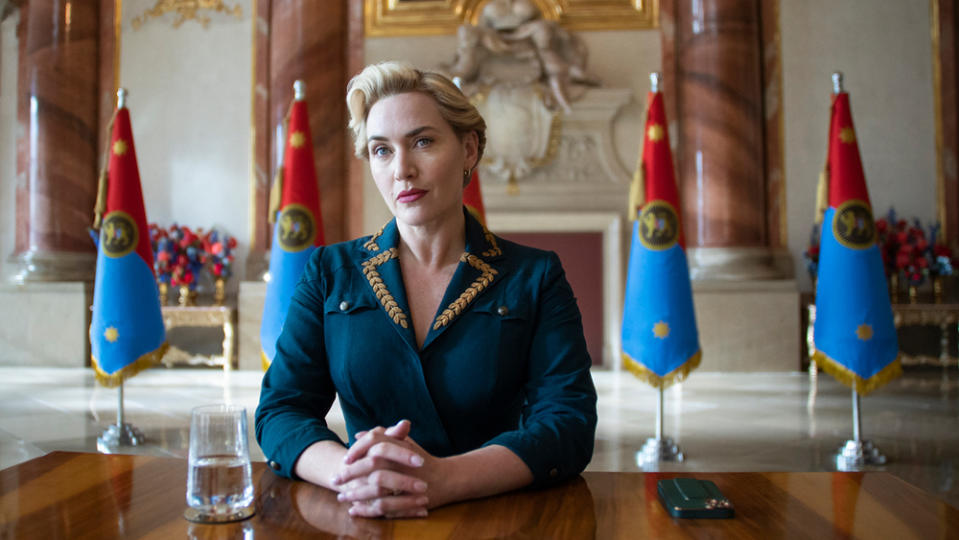In ‘The Regime,’ Fantasy Is as Damning as Satire

“The Regime” is and is not a satire. Yes, the HBO series is about a fictional dictator who behaves in ways that are as unhinged and capricious as the real autocrats and billionaires of our world. But in a post-“Veep” world where the Not The Onion subreddit couldn’t be going stronger? Spoofing the hypocrisy of powerful people runs the risk, in itself, of feeling absurd — at least if that’s the only point a story has to make.
Satire can only be so sharp for so long, after all. And with the internet’s flattening of tone and intent, it’s all too easy for edgy jokes to spiral into actual horrific beliefs. “The Regime” creator Will Tracy has seen how the appetite for satire and its reception have changed over the course of his career. While most recently known as part of the juggernaut writers’ room on “Succession” and for the blackly funny thriller “The Menu,” before that, he spent time in the reporting bullpen of The Onion and in the writer’s room for John Oliver’s “Last Week Tonight.”
More from IndieWire
Conan O'Brien Reflects on 'Hot Ones' Appearance: 'Many of My Friends Went Online and Thought I Died'
Ebon Moss-Bachrach Says He Has to 'Protect' Jeremy Allen White When Fans 'Get Really Excited'
If he’d written something like “The Regime” back then, Tracy reflected on an episode of the Filmmaker Toolkit podcast, it might have stuck more closely to capital-P, capital-S, Political Satire. “My great worry when I was writing [‘The Regime’] was that it would just be warmed-over Iannucci or something,” Tracy said, referring to Armando Iannucci, the satiric master behind “Veep” and “The Thick of It,” who has since, perhaps tellingly, gone on to make the sci-fi comedy “Avenue 5” and an impish adaptation of “David Copperfield.”
“The story [needed] a political throughline that brings you through the series, but it’s really running parallel to this love story, if you want to call it that, between the two [main] characters,” Tracy told IndieWire.

The first and last scenes between Elena and Herbert were consciously shot like fairy tales. The first episode has a number of classic Stephen Frears’ canted angle shots of Elena’s palace as Zubak is dragged into it and jarring, dreamlike jumps through rooms that probably don’t make a ton of sense lined up together. “It has a feel of ‘Sleeping Beauty’ to it: ‘I know you. I walked with you once upon a dream.’ It kind of feels like that when they see each other. And that’s the way they make each other feel until reality intrudes on their fairy tale,” Tracy said.
Even after reality intrudes and ruins Elena and Herbert’s Christmas with a pesky palace coup, the pool where the two have their last real conversation with each other casts a strong, flickering blue light onto the pair; it’s a visual enchantment that we know isn’t actually magic. “They willfully decide to pretend that the fairy tale is still going and that they can live happily ever after,” Tracy said.
This slightly stylized approach to a love that may or may not be real doesn’t distract from the politics of “The Regime.” It actually makes the satire more interesting. The miniseries is not just a story about small, bad people given the keys to a country. It’s a story about how people, be they all-powerful or ordinary, deceive themselves.
“[Elena’s] whole thing is wanting to feel as though she contains these great reservoirs of real feeling and real ideas. And her fear is that maybe she doesn’t,” Tracy said. A love story and/or an anxious obsession masquerading as a great love allows for the appearance of depth. It allows the show to get away with casting an actor as empathetic and intelligent as Kate Winslet to play a character who ultimately just might be a bit shallow, with an internal life that isn’t nearly at the level of the amount of power she holds.

“Kate was brilliant in calibrating exactly how much to bring the audience in on what her level of self-awareness is, which is a question that runs throughout the show,” Tracy said. According to the “The Regime” creator, the last episode, wherein Elena is forced out of her palace reality and has to see how people really live, was intentionally a test of her cognitive dissonance.
“Is she willing to accept that these people are living in abject conditions, and it’s my fault? Or is she somehow able to tell herself the story I think very powerful people who do terrible things are often able to, that it’s somehow not their fault?” Tracy said. “Kate’s quite brilliant in the ambiguity of the performance. We’re still not sure at the end what the answer to that question is.”
The fact that there isn’t an answer is perhaps a failure all on its own. The ease with which Elena slips in and out of fantasy in “The Regime” hits in the same way that someone shouting “No fighting in the War Room!” does. The dissonance of indulging in fantasy is, for this world, just as damning as the dissonance of hypocrisy is for others. “I felt my role throughout production was trying to remember not only the tragedy at the heart of the story but trying to play it straight as much as we could,” Tracy said. “The straighter that you can play that, hopefully, the more horrifying it will be.”
Best of IndieWire
The Best Father and Son Films: 'The Tree of Life,' 'The Lion King,' 'Nowhere Special,' and More
The 51 Best Sexy Movies of the 21st Century, from 'Spring Breakers' to 'X'
The 14 Best Thrillers Streaming on Netflix in June, from 'Fair Play' to 'Emily the Criminal'
Sign up for Indiewire's Newsletter. For the latest news, follow us on Facebook, Twitter, and Instagram.

 Yahoo News
Yahoo News 
